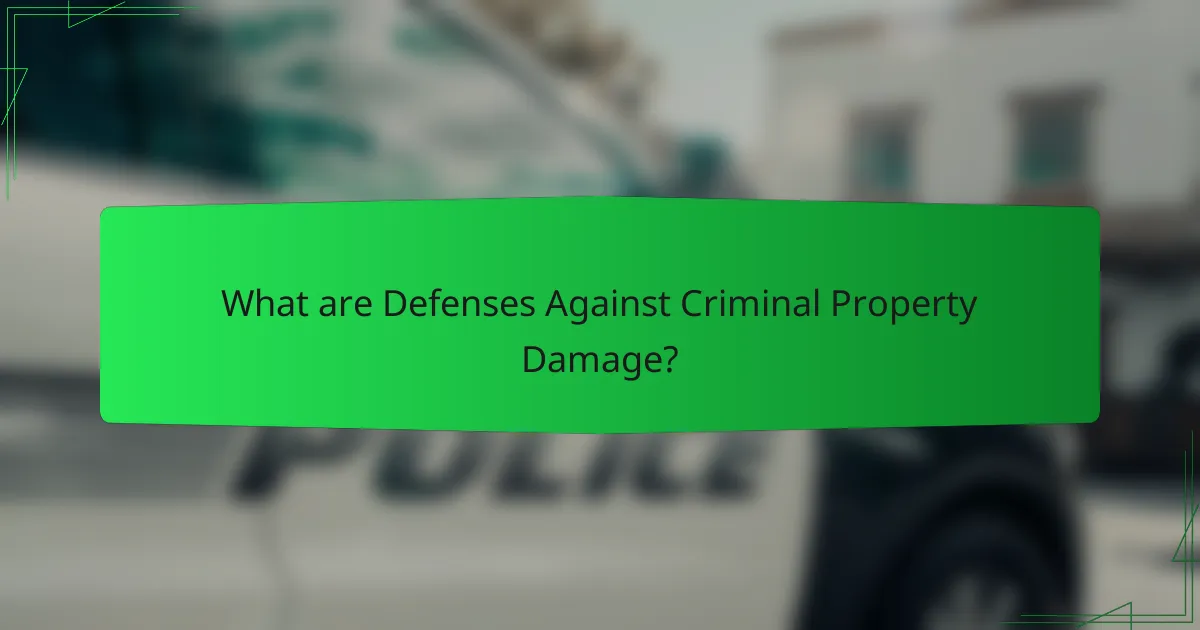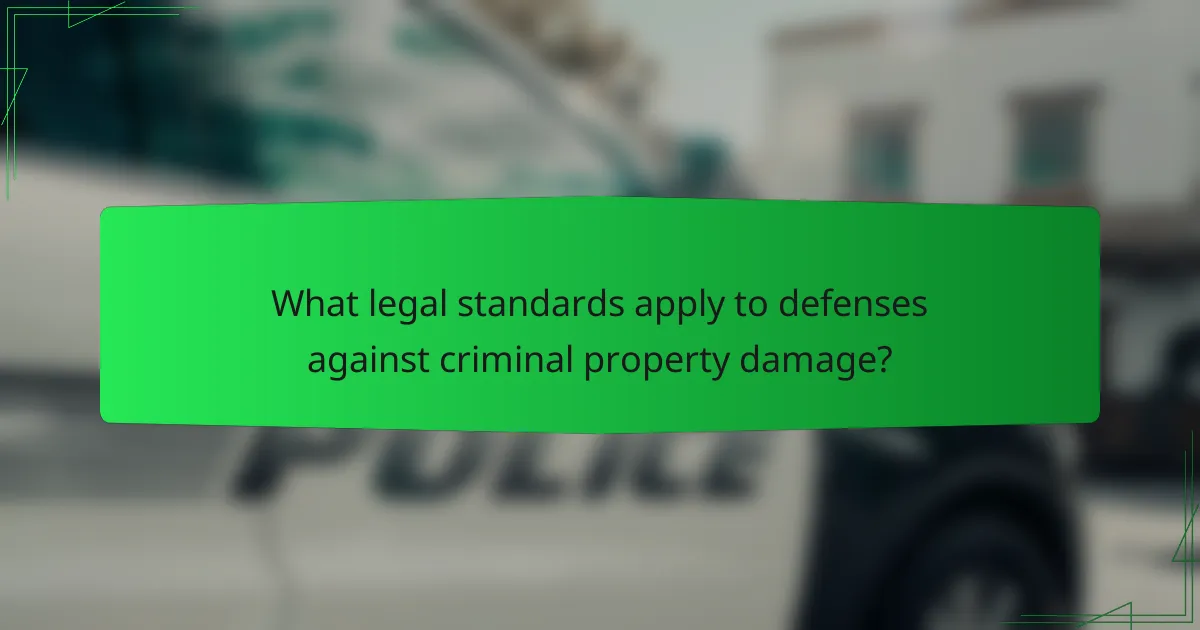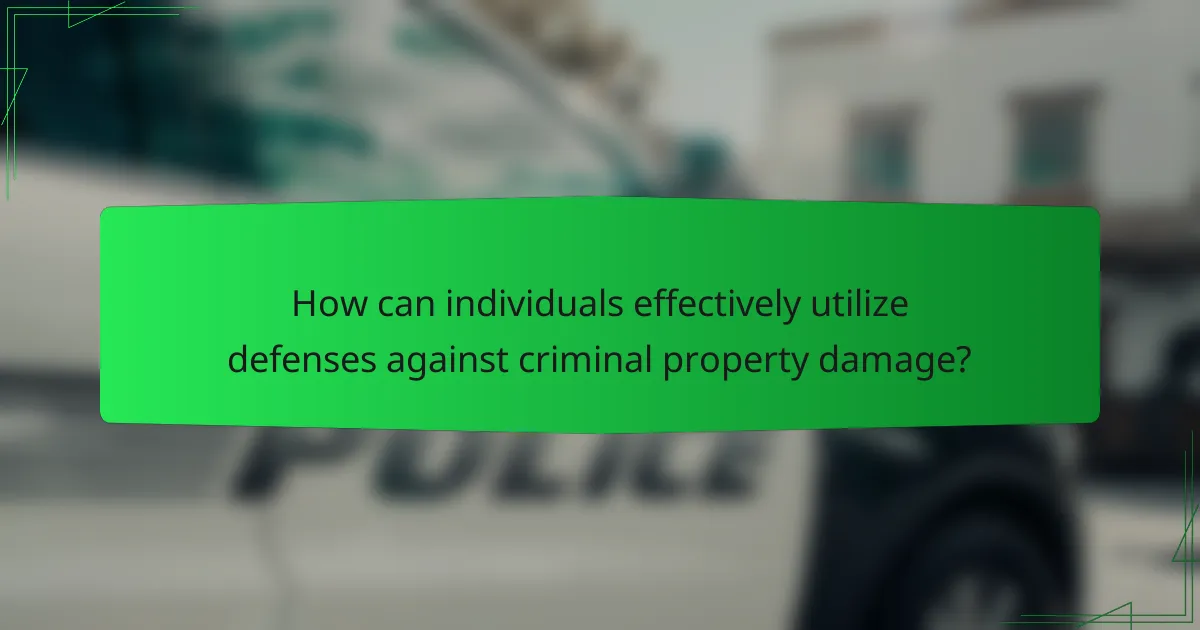Defenses against criminal property damage include necessity, consent, and self-defense, which provide legal justifications for actions taken to protect oneself or prevent greater harm. The necessity defense allows for property damage to avert more significant threats, while consent negates liability when the property owner agrees to the damage. Self-defense applies when damage is necessary to protect individuals from imminent harm. Legal standards for these defenses vary by jurisdiction and are assessed based on the reasonableness of the actions taken. Additionally, individuals can enhance their protection against property damage through preventive measures, awareness of local laws, and engagement in community vigilance programs.

What are Defenses Against Criminal Property Damage?
Defenses against criminal property damage include necessity, consent, and self-defense. Necessity allows individuals to damage property to prevent greater harm. Consent refers to situations where the property owner agrees to the damage. Self-defense applies when property is damaged to protect oneself or others from imminent harm. Each defense must be supported by specific circumstances. For example, necessity is often justified in emergencies. Legal standards vary by jurisdiction, influencing the applicability of these defenses.
How do these defenses protect individuals and property?
Defenses against criminal property damage protect individuals and property by providing legal justifications for actions taken in response to threats. These defenses can deter potential offenders by establishing consequences for property damage. For instance, self-defense laws allow individuals to protect their property from imminent harm. This legal framework ensures that individuals can act to prevent damage without facing criminal charges. Additionally, the use of reasonable force in defense of property is often legally supported. This principle reinforces the right to safeguard one’s belongings. Statistically, regions with strong property defense laws report lower instances of vandalism and theft. Thus, these defenses serve as a deterrent while empowering individuals to protect their assets legally.
What legal principles underlie these defenses?
The legal principles underlying defenses against criminal property damage include necessity, self-defense, and consent. Necessity allows individuals to damage property to prevent greater harm. Self-defense justifies property damage when protecting oneself or others from imminent harm. Consent implies that if the property owner agrees, damage may not constitute a crime. These principles are rooted in common law and aim to balance individual rights with societal interests. Courts have upheld these defenses in cases where the actions were reasonable and proportionate to the situation. For instance, in the case of State v. McCoy, the court recognized necessity as a valid defense when the defendant damaged property to avert a disaster.
How do these defenses differ based on jurisdiction?
Defenses against criminal property damage vary significantly based on jurisdiction. Different states or countries have distinct laws governing the acceptable defenses. For instance, some jurisdictions may recognize the defense of necessity, allowing property damage to prevent greater harm. In contrast, others may not accept this defense at all. Additionally, the distinction between criminal mischief and civil liability can differ widely. Certain jurisdictions may impose harsher penalties for property damage, influencing the strategies available for defense. Legal precedents also shape how defenses are interpreted and applied, leading to variability. Ultimately, the specific statutes and case law in each jurisdiction dictate the available defenses.
What types of defenses are available against criminal property damage?
Defenses against criminal property damage include necessity, consent, and self-defense. Necessity applies when an individual damages property to prevent greater harm. For example, breaking a window to rescue someone from a fire may be justified. Consent occurs when the property owner allows the damage or alteration. This defense is valid if there is clear permission from the owner. Self-defense is applicable when property damage is a reaction to an immediate threat. For instance, damaging property to escape an attacker can be justified under this defense. Each defense must be supported by evidence to be valid in court.
What is the difference between affirmative and reactive defenses?
Affirmative defenses and reactive defenses are distinct legal strategies in criminal law. Affirmative defenses involve the defendant admitting to the act but asserting a legal justification or excuse. Common examples include self-defense and insanity. Reactive defenses, on the other hand, focus on disproving the prosecution’s claims without admitting to the act. They often involve challenging evidence or establishing alibis. The key difference lies in the approach; affirmative defenses acknowledge the act while justifying it, whereas reactive defenses deny the act’s occurrence or legality.
How do self-defense and defense of property function legally?
Self-defense and defense of property are legal concepts that allow individuals to protect themselves and their belongings. Self-defense is justified when a person reasonably believes they are in imminent danger of physical harm. The use of force must be proportional to the threat faced. Defense of property allows individuals to use reasonable force to prevent unlawful interference with their possessions. However, deadly force is typically not justified solely for property defense. Legal standards vary by jurisdiction, influencing the specifics of what constitutes reasonable belief and proportionality. Courts often assess the circumstances surrounding each case to determine the legality of the actions taken.

What legal standards apply to defenses against criminal property damage?
Legal standards for defenses against criminal property damage include necessity, consent, and self-defense. The necessity defense applies when the damage was done to prevent greater harm. Consent involves the property owner’s permission, which can negate liability. Self-defense applies if the damage was necessary to protect oneself from imminent harm. Courts assess these defenses based on the reasonableness of the actions taken. Each jurisdiction may have specific statutes outlining these standards. For instance, the Model Penal Code provides guidelines on necessity and justification defenses. These standards help ensure that individuals are not unjustly penalized for actions taken in specific circumstances.
How are these legal standards determined?
Legal standards are determined through a combination of statutory law, case law, and regulatory guidelines. Statutory law consists of laws enacted by legislative bodies. Case law is established through judicial decisions in courts. Regulatory guidelines are set by government agencies to enforce specific laws. Legal standards evolve through judicial interpretation and precedent. Courts analyze past cases to inform decisions on current legal standards. This process ensures consistency and fairness in the application of the law. For example, the Model Penal Code provides a framework for understanding criminal liability across jurisdictions.
What role do statutes and case law play in establishing these standards?
Statutes and case law are crucial in establishing legal standards for defenses against criminal property damage. Statutes provide the written laws enacted by legislative bodies. These laws define offenses, penalties, and permissible defenses. Case law, developed through judicial decisions, interprets statutes and sets precedents. Courts apply these precedents to similar cases, ensuring consistency in legal standards. For example, specific statutes outline what constitutes criminal property damage. Case law further clarifies the applicability of defenses, such as necessity or self-defense. Together, they shape the legal framework governing property damage cases. This framework allows for the assessment of individual circumstances against established legal standards.
How do evidentiary requirements affect the application of these defenses?
Evidentiary requirements significantly influence the application of defenses against criminal property damage. These requirements determine the type and quality of evidence needed to support a defense claim. For instance, a defendant must provide credible evidence to substantiate claims such as self-defense or necessity. Failure to meet these evidentiary standards can result in the dismissal of the defense. Courts often require specific documentation, witness testimonies, or expert opinions to validate the defense. Without adequate evidence, even a legitimate defense may be rendered ineffective. Therefore, the success of defenses in property damage cases heavily relies on the fulfillment of evidentiary requirements.
What are the consequences of successfully employing a defense?
Successfully employing a defense against criminal property damage can lead to the dismissal of charges. This outcome protects the accused from legal penalties. It can also result in the preservation of the defendant’s reputation. Maintaining a positive public image is crucial for individuals and businesses alike. Furthermore, a successful defense may deter future claims or lawsuits. This deterrence can minimize financial losses associated with legal disputes. Additionally, it can reinforce the legal precedent for similar cases. Establishing a strong defense contributes to the overall integrity of the legal system.
How does a successful defense impact criminal liability?
A successful defense can eliminate or reduce criminal liability. When a defendant proves their defense, it may lead to acquittal or a lesser charge. Common defenses include self-defense, insanity, and alibi. Each defense challenges the prosecution’s case. For instance, self-defense justifies actions taken to protect oneself from harm. If proven, it negates liability for the act committed. Insanity defenses argue that the defendant lacked mental capacity during the crime. This can result in commitment to a mental health facility instead of prison. Alibi defenses provide evidence that the defendant was not present at the crime scene. This can create reasonable doubt in the prosecution’s case. Ultimately, a successful defense shifts the burden of proof back to the prosecution, impacting the outcome of the case significantly.
What are the potential civil repercussions of property damage claims?
The potential civil repercussions of property damage claims include financial liability and compensation for damages. When a property damage claim is filed, the responsible party may be required to pay for repairs or replacement of the damaged property. Additionally, they may face punitive damages if the act was deemed malicious or negligent. Legal fees can also accumulate for both parties involved in the claim. In some cases, the responsible party may experience increased insurance premiums following a claim. If the claim is taken to court, the outcome can lead to a formal judgment against the responsible party. This judgment can affect credit ratings and financial standing. Overall, property damage claims can have significant financial and legal consequences for the liable party.

How can individuals effectively utilize defenses against criminal property damage?
Individuals can effectively utilize defenses against criminal property damage by implementing preventive measures and understanding legal rights. Installing security systems, such as cameras and alarms, deters potential offenders. Regular property maintenance reduces vulnerabilities that may invite damage.
Educating oneself about local laws empowers individuals to respond appropriately during incidents. Engaging with neighborhood watch programs fosters community vigilance. Keeping detailed records of property can aid in legal claims if damage occurs.
Insurance policies provide financial protection against losses from property damage. According to the Insurance Information Institute, insured properties recover faster from damage incidents. Utilizing these strategies enhances protection against criminal property damage.
What steps should one take when facing allegations of property damage?
Document the incident thoroughly. Take photos of the alleged damage and gather any relevant evidence. Review any contracts or agreements related to the property. Consult with a legal professional experienced in property damage cases. Prepare a written response to the allegations, clearly stating your position. Communicate with the accuser to seek a resolution, if appropriate. Avoid making any admissions of liability without legal advice. Keep records of all communications and actions taken regarding the allegations.
How can documentation and evidence support a defense strategy?
Documentation and evidence can significantly support a defense strategy by providing factual support for claims. These materials can include photographs, witness statements, and expert reports. They help establish timelines and verify alibis. Additionally, documentation can demonstrate the absence of intent or knowledge regarding alleged property damage. Evidence can also highlight inconsistencies in the prosecution’s case. For example, if a defense can present video footage showing a lack of involvement, it strengthens their position. Courts rely on concrete evidence to make informed decisions. Thus, thorough documentation increases the likelihood of a favorable outcome in legal proceedings.
What resources are available for legal assistance in such cases?
Legal assistance for criminal property damage cases can be found through various resources. Public defenders provide legal representation for those who cannot afford a private attorney. Legal aid organizations offer free or low-cost legal services to eligible individuals. Law school clinics allow law students to gain experience while providing legal assistance under supervision. Online legal services also offer consultations and resources at a reduced cost. Additionally, local bar associations can refer individuals to qualified attorneys specializing in criminal law. These resources ensure access to legal support for those facing criminal property damage charges.
Defenses against criminal property damage encompass legal justifications such as necessity, consent, and self-defense. This article provides an overview of these defenses, detailing how they protect individuals and property, the legal principles that underpin them, and the variations based on jurisdiction. It further explores the differences between affirmative and reactive defenses, the evidentiary requirements for successful claims, and the potential civil repercussions of property damage allegations. Additionally, the article outlines effective strategies for individuals to utilize these defenses and the resources available for legal assistance in such cases.